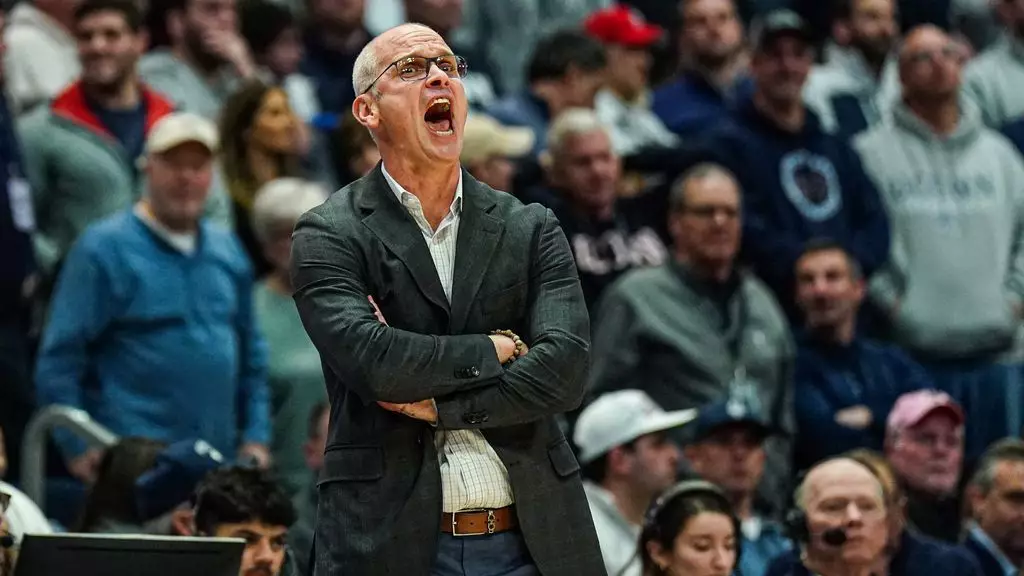The NCAA tournament is a crucible where dreams are forged and shattered, and for UConn’s coach Dan Hurley, the recent upset in round two against Florida was emblematic of a bitter ending. As the final buzzer echoed in the arena, the emotions of defeat overwhelmed Hurley, culminating in a regrettable outburst that has overshadowed the loyal legacy of the team and the talents that shaped this season. With the heart-wrenching 77-75 loss fresh in his mind, Hurley’s immediate reaction was far from composed, leaving him grappling with the implications of his words and actions.
Caught on camera, Hurley expressed frustration about the officiating with comments that could best be described as profane and passionate. This moment, intended as a private reflection among competitors, unfortunately became fodder for public scrutiny, showcasing how even the fiercest of competitors can falter under pressure. His acknowledgment of regret is an all too familiar tale in sports, where the heat of passion often blurs the line between integrity and impulsivity. Yet, it is not just a snapshot of poor judgment; it opens a dialogue on how frustrations may manifest in high-stress environments.
The Burden of Responsibility
In the aftermath, Hurley’s public reassessment of his actions highlights an essential truth: leadership often entails accepting responsibility for one’s actions and their ripple effects. He expressed remorse not only for his comments but also for how his behavior impacted those involved in the situation: the officiating crew, his players, and even the media team. In an age of instant virality, a fleeting moment can spiral into a media storm, affecting reputations and perceptions.
While Hurley’s emotions are understandable, particularly in light of a three-year journey that culminated in disappointment, this incident should remind us that leaders carry the burden of their influence. The blame cannot rest solely on an emotional response; how those responses are managed—and mismanaged—defines one’s character in both triumph and defeat. His willingness to reflect is commendable; however, the responsibility falls heavily in the realm of leadership to temper one’s responses to preserve the dignity of an institution as esteemed as UConn.
A Broader Reflection on Sports Culture
This episode transcends a singular incident and highlights a broader cultural issue within competitive sports. The competitive spirit can often spiral into something toxic unless there are measures to curb emotional outbursts. Hurley’s history of fiery incidents during the season—from complaints over officiating in earlier tournaments to confrontations with fans—raises questions about what it means to be competitive without losing sight of sportsmanship.
This scrutiny points to a great paradox within sports: the very qualities that drive excellence—passion, determination, and competitiveness—can also lead to regrettable moments if not balanced with self-discipline. Coaches and players must cultivate emotional intelligence alongside their unmistakable drive for victory.
Personal Growth Amid Challenges
For Hurley, the path forward appears complicated but necessary. He recognizes that his emotional journey is intimately tied to his coaching philosophy, a blend of intensity and passion that has characterized his tenure. Yet, grappling with the fallout of his actions may offer an opportunity for personal growth and a chance to evolve his approach to the emotional rigors of coaching. By embracing internal reflection and external training, he can transform these experiences into a foundation for more constructive conflict-resolution strategies.
Acknowledging this, he hinted at a desire to be more measured, further asserting that he hopes to learn from these moments. It is not merely about controlling outbursts, but fostering an environment where raw emotions can coexist with respect and integrity on and off the court.
In an era where media scrutiny is at an all-time high, the navigation of accountability is fraught with challenges. Nevertheless, Hurley’s journey—the missteps, the regrets, the intentions for betterment—reveals a crucial lesson for coaches and athletes alike: vulnerability does not equate to weakness, but rather opens doors for connection, understanding, and ultimately growth. It serves as a reminder that in the chaotic theater of sports, how one reacts and learns from setbacks can often resonate far longer than any victory.


Leave a Reply